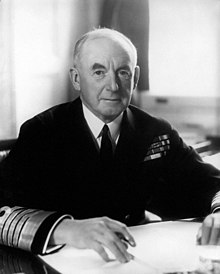Sir Dudley Pound | |
|---|---|
 Admiral of the Fleet Sir Dudley Pound | |
| Birth name | Alfred Dudley Pickman Rogers Pound |
| Born | 29 August 1877 Ventnor, England |
| Died | 21 October 1943 (aged 66) Royal Masonic Hospital, London, England |
| Allegiance | United Kingdom |
| Service | Royal Navy |
| Years of service | 1891–1943 |
| Rank | Admiral of the Fleet |
| Commands | First Sea Lord (1939–43) Mediterranean Fleet (1936–39) Battle Cruiser Squadron (1929–31) HMS Repulse (1920–22) HMS Colossus (1915–17) |
| Battles / wars | First World War Arab revolt in Palestine Second World War |
| Awards | Knight Grand Cross of the Order of the Bath Member of the Order of Merit Knight Grand Cross of the Royal Victorian Order Mentioned in Despatches Officer of the Legion of Honour (France) Grand Cross of the Order of Polonia Restituta (Poland) Grand Cross of the Royal Norwegian Order of St Olav Navy Distinguished Service Medal (United States) |
Admiral of the Fleet Sir Alfred Dudley Pickman Rogers Pound, GCB, OM, GCVO (29 August 1877 – 21 October 1943) was a British senior officer of the Royal Navy. He served in the First World War as a battleship commander, taking part in the Battle of Jutland with notable success, contributing to the sinking of the German cruiser Wiesbaden.
He served as First Sea Lord, the professional head of the Royal Navy, for the first four years of the Second World War. In that role his greatest achievement was his successful campaign against the German U-boats and the winning of the Battle of the Atlantic but his judgment has been questioned over the failed Norwegian Campaign in 1940, and his dismissal of Admiral Dudley North in 1940. His order in July 1942 to disperse Convoy PQ 17 and withdraw its covering forces, to counter a threat from heavy German surface ships, led to its destruction by submarines and aircraft. His health failed in 1943 and he resigned, dying shortly thereafter.